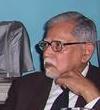 I shall conclude today’s reverential remembrances with Dr MKA Siddiqui. A distinguished anthropologist and public intellectual, a grandson of a leading figure during India’s first war of independence in 1857, well-known for his work on the Muslims of Calcutta and India, on Calcutta’s slums, on problems of education of the slum poor, on marginalised communities, and for his long advocacy of human development concerns. Through his extensive work, Dr Siddiqui had realised the importance of the issue of slum-based manufacturing in any thinking about the city’s future. In the late-90s, he undertook a survey of slum trades and crafts in Calcutta. Based on this, he produced a documentary video as a means for promoting public concern and action.
I shall conclude today’s reverential remembrances with Dr MKA Siddiqui. A distinguished anthropologist and public intellectual, a grandson of a leading figure during India’s first war of independence in 1857, well-known for his work on the Muslims of Calcutta and India, on Calcutta’s slums, on problems of education of the slum poor, on marginalised communities, and for his long advocacy of human development concerns. Through his extensive work, Dr Siddiqui had realised the importance of the issue of slum-based manufacturing in any thinking about the city’s future. In the late-90s, he undertook a survey of slum trades and crafts in Calcutta. Based on this, he produced a documentary video as a means for promoting public concern and action.In April, together with other colleagues from Calcutta, Delhi and New Zealand, I managed to complete a funding application for an action-research study on slum manufacturing in Calcutta, towards structural upgrading of these trades – which form a significant part of the city economy - for securing sustainable livelihoods of Calcutta’s labouring poor. Something like 300,000 people are dependent on such trades – e.g garments, footwear, paper-crafts, embroidery - for their livelihood. Dr Siddiqui is the revered elder guiding the Indian civil society partnership initiating this effort towards social inclusion.
In a context of religious polarisation and conflict, and chronic disregard in public policy of the plight of the Muslim community in India, West Bengal and Calcutta, Dr Siddqui has been a voice of reason and harmony. He has highlighted the underlying social and economic travails of the community, while emphasising the education and livelihood related imperatives for building a truly secular democratic republic.
He has also been a body-builder for me. In mid-2000, floundering and dejected in the midst of my crazy, quixotic mission to work with and for poor Muslim slumdwellers in metropolitan Calcutta, I was introduced to Dr Siddiqui by my old friend and fellow-activist Dr Pasupati Mahato. What a momentous and fortuitous union that was! Dr S and I love each other dearly, he is like a father to me, and I have been working with his encouragement and guidance.


No comments:
Post a Comment